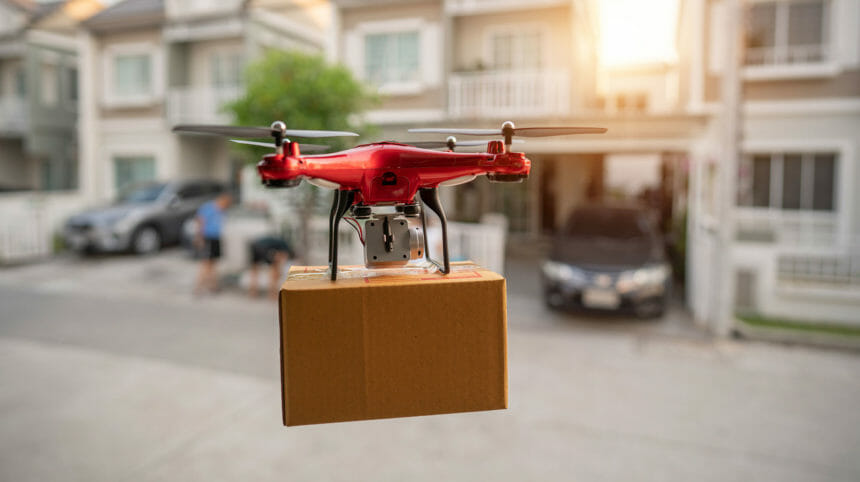
In the middle of a viral crisis fueled by human interaction, artificial intelligence and flying drones came to rescue of marooned senior housing residents and staff caught up in pandemic lockdowns.
Across the skies of west central Florida, drones are retrieving prescription medications from CVS Pharmacies and delivering them to The Villages, one of the country’s biggest retirement communities. The first flights will be less than a half mile, with the potential to expand deliveries from two additional CVS pharmacies in the area, according to UPS. The ultimate goal of the program is to make deliveries directly, with the drone lowering packages by winch, according to the company.
Meanwhile, Connecticut-based Maplewood Senior Living found a creative way to support its residents while maintaining their overall health and wellness by introducing robot “friends” to its 15 communities in five states.
The COVID-19 pandemic and its attendant lockdown inspired Maplewood to introduce “Temi” robots, including Quincy, MA-based Connected Living, to residents of its communities ahead of a planned rollout at its Inspir Carnegie Hill luxury high-rise in New York City.
Brian Geyser, vice president of clinical innovation and population health at Maplewood Senior Living, said the plan was an opportunity to “pull the trigger” on a program to help residents cope with social distancing.
“They’re cute. They’re entertaining. The residents love them,” he said of the robots. “They have kind of personalities. They tell jokes, and they’ll give the weather and they’ll ask questions. They’re just nice to have around.”
Equipped with pre-configured tablets, the robots come with Alexa-enabled skills, a TV channel with programming designed for seniors and a smartphone app to help residents stay connected with their families.
A 2018 study by Perkins Eastman predicted that artificial intelligence and robots would be the leading disruptors of the senior living market.
FOCUS ON FURNISHINGS BRIEFS
- Senior living communities across the country faced mounting uncertainties in the early days of the global pandemic. A major unknown: when to push “go” on a host of unfinished renovation projects. That didn’t preclude the need for furnishings, however. For example, Stance Healthcare, parent company of Open Road Furnishings, found itself fielding a slew of urgent orders for furnishings to outfit “pop up” testing clinics and temporary hospital spaces. In response, the company implemented a “quick ship” program to expedite facility requests. The company was able to get furniture to clients in fewer than 15 days.
- Mark Huxta, director of healthcare for Ecore, said the company focused on assuring customers that its plants were building furniture for facilities and shipping samples to architects’ homes, all while the provider community found itself in the fog of COVID chaos.
- Sherwin-Williams has created an Architect and Designer Support Center, a dedicated website to point professionals to educational tools and creative resources to help them navigate today’s challenging times. The online resource center provides access to Sherwin-Williams insights, continuing education and news. Key sections of the center include business resources, educational opportunities and a special COVID-19 response hub, where visitors can read inspiring articles.
- Kwalu has partnered with Clorox Healthcareto target the reduction of healthcare-associated pathogens. Kwalu’s non-coated, non-porous Clorox compatible furniture can withstand the most rigorous cleaning protocols while exceeding hospital furniture standards, the company said. Through the partnership, Kwalu will combine Clorox Healthcare’s portfolio of disinfectants with Kwalu’s non-porous, non-coated furnishings.
- H Contract has debuted in the tablet and power source seating category. Developed for senior living common areas, the chairs were designed to “float” in a room.

